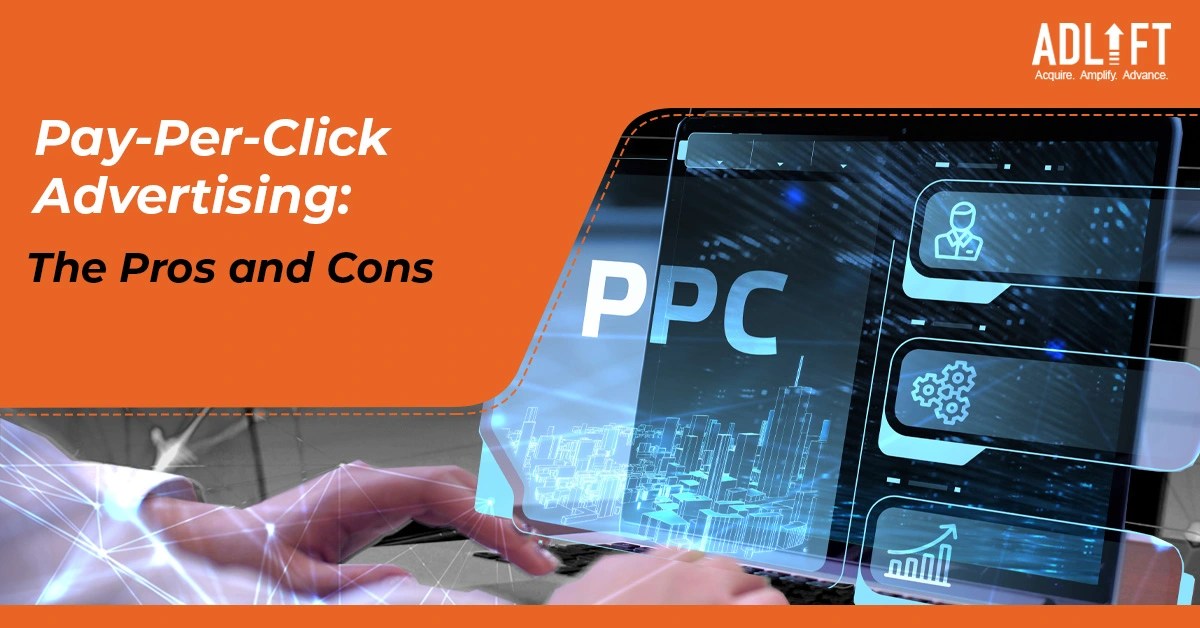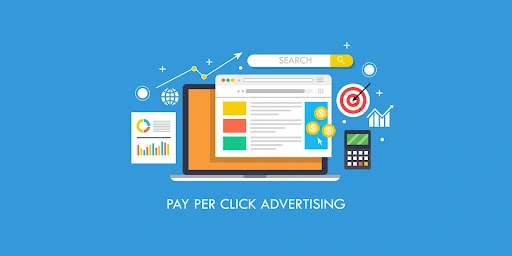Pay-Per-Click Advertising: The Pros and Cons

In the contemporary and dynamic world of digital marketing, enterprises are continuously seeking innovative and fresh methods to lure customers and generate sales. Among the manifold strategies for digital advertising, Pay-Per-Click (PPC) advertising is an immensely prevalent and widely utilized tactic. In the realm of online advertising, PPC advertising enables firms to remunerate only when a user clicks on their advertisement.
This blog endeavors to scrutinize the merits and demerits of pay-per-click advertising, giving you invaluable insights that will help you decide if you want to opt for pay-per-click advertising for your business or not.
Pros of Pay-Per-Click Advertising:
Highly Targeted Advertising
PPC advertising allows you to target specific audiences based on a variety of factors such as location, age, gender, interests, and even the device they are using. This means that your ads will only be shown to people who are most likely to be interested in your products or services, increasing the likelihood of conversions and reducing the amount of wasted ad spend.
Immediate Results
Unlike other forms of advertising, PPC advertising can provide immediate results. Once your ad campaign is set up and launched, your ads will start appearing in search engine results pages (SERPs) or on websites immediately, giving you a quick boost in traffic and potential sale.
Complete Control Over Ad Spend
PPC advertising provides complete control over your ad spend. You can set daily, weekly, or monthly budgets and adjust them as needed to ensure that you are getting the best possible return on investment (ROI) for your ad spend.
Measurable Results
Pay-per-click advertising provides measurable results, allowing you to track clicks, conversions, and ROI. This means that you can easily identify which ad campaigns are most effective and adjust your strategy accordingly.
Flexibility
PPC advertising is highly flexible, allowing you to make changes to your campaigns at any time. This means that if you notice that your ads are not performing as well as you’d like, you can make changes to your targeting, ad copy, or bidding strategy to improve your results.
Cons of Pay-Per-Click Advertising:
Can be Expensive
PPC advertising can be expensive, especially if you are in a highly competitive industry. Bidding for top ad placements can be costly, and if you are not careful, you can quickly eat through your ad spend without getting the desired results.
Requires Constant Monitoring
Pay-per-click advertising requires constant monitoring to ensure that your ads are performing as expected. You need to monitor your ad spend, clicks, conversions, and ROI regularly and make adjustments as needed to optimize your campaigns for maximum results.
Learning Curve
PPC advertising can be complex and requires a certain level of knowledge and expertise to get the best results. If you are new to PPC advertising, you may need to invest time and money in training or hire a professional to manage your campaigns.
Limited Ad Space
Pay-per-click advertising provides limited ad space, which means that you need to make every character count. Writing effective ad copy that grabs the attention of your target audience and encourages them to click through to your website can be challenging.
Risk of Click Fraud
PPC advertising is vulnerable to click fraud, where malicious actors click on your ads repeatedly to drain your ad spending without providing any value. This can be a significant risk, especially if you are not monitoring your campaigns regularly.
If you are new to PPC advertising, we recommend starting with a small budget and testing different targeting and ad copy options to determine what works best for your business. Once you have a better understanding of what works, you can gradually increase your budget and expand your campaigns.
It’s also important to regularly monitor your campaigns and adjust your strategy as needed to ensure that you are getting the best possible results for your ad spend. This may include testing new ad copy, adjusting your bidding strategy, or targeting new audiences.
PPC advertising can be a powerful tool for businesses looking to attract new customers and drive sales. However, it’s important to understand the pros and cons and develop a well-thought-out strategy that takes into account your budget, goals, and target audience. With the right approach, PPC advertising can provide immediate and measurable results that can help your business grow and succeed online.
FAQs
To initiate PPC advertising for a small business:
- Define clear goals and target audience.
- Choose suitable platforms like Google Ads or social media.
- Conduct keyword research for relevant terms, create compelling ad content, and set a budget.
- Monitor and optimize campaigns regularly, adjusting keywords and bids for maximum effectiveness.
Landing pages should align with ads to enhance user experience. As you gain insights, refine strategies to achieve better results over time.
To choose the ideal PPC advertising platform:
- Consider your target audience, budget, and goals.
- Research platforms like Google Ads, Facebook Ads, and Microsoft Advertising.
- Evaluate their reach, targeting options, and ad formats.
- Analyze cost-per-click, competition, and conversion tracking capabilities.
- Opt for the platform aligning best with your business objectives and resources.
- Regularly monitor and optimize campaigns for optimal results.
Setting a budget for PPC advertising involves several key steps. Start by defining your campaign goals and target audience. Research relevant keywords and analyze their costs. Determine your maximum cost-per-click (CPC) bid based on your budget and keyword competitiveness. Consider factors like industry benchmarks and your desired ROI. Monitor and adjust your budget regularly to optimize campaign performance and ensure you get the best results within your budget.
Measuring the ROI of PPC advertising involves assessing the effectiveness of your campaign in generating desired outcomes. Calculating ROI requires comparing the revenue generated from the campaign against the total costs, including ad spend and management fees. This can be done using the formula: (Revenue – Cost) / Cost, expressed as a percentage. Tracking conversions, click-through rates and monitoring key performance indicators are essential to evaluate your PPC efforts’ impact and profitability accurately.
To optimize a PPC campaign for improved results, focus on relevant keywords, compelling ad copy, and targeted landing pages. Regularly monitor and adjust bids, utilize negative keywords, and conduct A/B testing to refine ads. Continuously analyze performance metrics, like click-through and conversion rates, to make data-driven adjustments for maximum effectiveness and ROI.
Choosing the right keywords for PPC advertising involves research, relevance, and competition analysis. Begin by understanding your target audience and brainstorming relevant terms. Use keyword research tools to assess search volume and competition. Focus on long-tail keywords for specificity and lower competition. Incorporate a mix of broad, phrase, and exact match keywords. Regularly monitor and adjust your keyword list based on performance data for optimal results.
Common mistakes to avoid in PPC advertising include poor keyword selection, neglecting negative keywords, failing to optimize landing pages, ignoring ad copy relevance, setting an inadequate budget, and not monitoring and adjusting campaigns regularly. It’s crucial to conduct thorough research, target the right audience, and continuously analyze performance to ensure a successful PPC campaign.
Writing a compelling ad copy for PPC advertising involves crafting concise, effective messages. Start with a clear headline that highlights benefits, uses keywords, and creates a sense of urgency. In the description, focus on the unique selling proposition, include a strong call-to-action, and match the ad to the landing page. Test different variations and analyze performance to refine your strategy.
Running a PPC campaign yourself can be done, but hiring a professional offers advantages. Experts have experience in keyword selection, ad copywriting, budget management, and optimization. They can save time, minimize costly mistakes, and enhance campaign performance for better results. Consider your expertise, time availability, and goals when deciding whether to handle it independently or hire a pro.
PPC advertising through Google AdWords functions by allowing advertisers to bid on exact keywords related to their products or services. When users search for these keywords, ads appear at the top of the search results. Advertisers pay a fee only if their ad is clicked, hence “pay-per-click” (PPC). Ad relevance and bid amount determine ad placement. This targeted approach ensures businesses reach potential customers actively searching for their offerings.
Categories
Recent Posts
- Boost Your Website’s Visibility with These Must-have B2B SEO Tools January 13, 2025
- Master Your Digital Strategy: Learn the 7 Types of SEO That Lead to High Rankings January 13, 2025
- 2024: A Year to Remember at AdLift! January 7, 2025
- How to integrate your SEO and paid search strategies to maximize efficiency and reduce CAC January 6, 2025
- SEO in 2025: Adapting to a Changing Search Landscape By Prashant Puri, CEO & Co-Founder, AdLift January 3, 2025
- Understanding the Google December 2024 Spam Update: What You Need to Know December 31, 2024
- Beware of Ongoing Scams Involving Fake AdLift Representatives December 31, 2024
- Facebook vs Twitter: Which Platform Wins for Your Marketing Goals? December 30, 2024
- The Art of Naming Conventions in Marketing Campaigns: Best Practices for Clarity and Success December 26, 2024
- Is Your Content Strategy Working for You — or Against You? December 19, 2024
Get
in Touch
Contact AdLift for a 360-degree marketing plan

